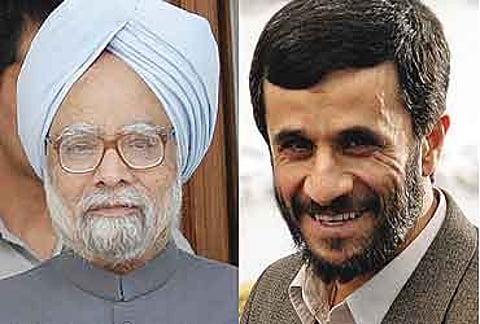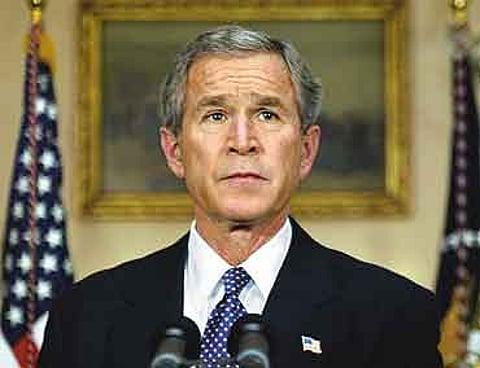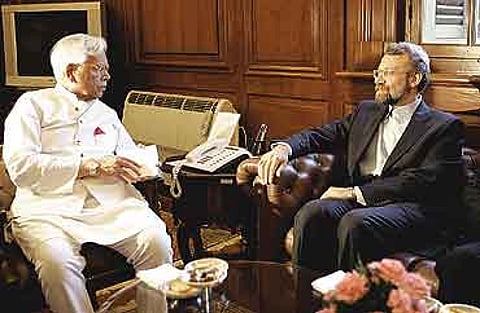NukeWarm
Tehran may be dismayed and domestic opinion riled, but New Delhi defends its vote for the US line on the IAEA resolution. So how does all this play up in the big game?<a > Updates</a>
- Access to Iran's oil, gas goes
- Access to Afghanistan, Central Asia becomes difficult for India; Pakistan does not allow transit
- China could occupy strategic space vacated by India vis-a-vis Iran
- India's access to Russia and Europe through the North-South corridor affected. It cuts transport time by 10-12 days, costs by 15-20 per cent.
- Iran's anger may affect the way OIC looks at India issues like Kashmir
- India's part in development of Chabahar port in Iran may hit snags

Other diplomatic sources point out that during his meeting with PM Manmohan Singh on August 31, Larijani put a phone call through to Iranian president Mahmoud Ahmedinejad. During the chat with Manmohan, Ahmedinejad himself cleared the LNG deal. On his return to Tehran, Larijani declared, "The issue of exporting Iran's LNG to India has been finalised."
But a new wrinkle crept into Indo-Iranian relations when Natwar visited Iran between September 2-5.Incidentally, he was the second foreign minister, after Kuwait's, to meet the new president, Ahmadinejad.Natwar was then carrying a message from the EU. Explains a senior diplomat, "Taking advantage of Natwar's visit, Jack Straw and Joschka Fischer (the British and German foreign ministers) called him and said, 'Since you are going, why don't you convey this message to Iran?' We conveyed the EU's concern to Iran, as also their desire to find a mutually acceptable solution to the impasse."
The diplomat argues India's vote does not represent "a drastic departure. What did we want? We knew from the beginning the EU3 had a majority. No matter how we voted, we knew the resolution would go through. Indeed, the original resolution wanted immediate referral to the UNSC." India wanted to delay it. "A similar kind of approach led to North Korea walking out of theNPT," he explained.

New Delhi, meanwhile, has been cautious in characterising the status of Iran's uranium enrichment programme. Asked if New Delhi believed Tehran is guilty on this count, the diplomat pointed to the speech delivered by Iranian vice-president Reza Aghazadeh in the IAEA after the vote. Referring to Iran's failure to report promptly on some aspects of its enrichment programme, Aghazadeh said, "As the result of unlawful and full-scale sanctions, some failures (in reporting to the IAEA) became unavoidable to avert total collapse of our peaceful nuclear activity. Iran embarked on remedying the failures through, inter alia, rigorous and sustained implementation of the additional protocol." In other words, Iran was admitting to some degree of lack of transparency.
The source continues: "Every effort was made to avoid confrontation on this issue. If Iran walks out of the npt and enriches uranium any way they want to, what options will the UNSC have? If it reacts by imposing sanctions, then the global energy situation will be exacerbated further. Even the threat of sanctions will push up oil prices. Is it in India's interest?"
This was the reason why India entered into complex bargaining with the US during the Manmohan visit to New York early in September. The Americans wanted an immediate transfer of the Iran issue to the UNSC. "We told the Americans we prefer the IAEA to sort the matter out. We will see if confrontation can be avoided in the next IAEA meeting in November. America shouldn't think that when they snap their fingers, we will fall in line. If we had to do that, we would have allowed the matter to go to the UNSC now."

Ultimately, sources suggest the decision was made factoring in the negative consequences on the energy situation as well as regional stability. The other factors taken into account were New Delhi's access to Afghanistan through Iran, and the 3.5 million Indians residing in West Asia.
It would seem the Indian stand was finessed during the EU-India meeting in New Delhi. Sources say this possibly happened in the one-to-one meeting between Manmohan and British PM and EU president Tony Blair. It became clear then that New Delhi could not vote on the draft as it existed. In New York, sources say, the EU interlocutors showed its draft of the IAEA resolution to the Indian delegation. "They shared their first draft and a second one; the final one was diluted further at New Delhi's insistence," a diplomat says.
At home, India's vote in the IAEA roiled the Left and the Opposition. But there was good news from Washington. US Congressman Tom Lantos, House International Relations Committee member, welcomed India's decision.Earlier, Lantos had called on India to choose between the US and Iran. Post-IAEA vote, Lantos said, "These actions will certainly promote positive consideration in Congress of the new US-India agreement to expand peaceful N-cooperation."
So did India act under US pressure? Walter Andersen, former intelligence director at the State Department, said, "The narrow answer is no, the broader answeryes. There wasn't specific pressure for India to vote one way or the other. But the Indians decided to vote in the interest of its relations with the US." He also said the decision "will help push the civil nuclear agreement in US Congress. That is something that would have figured in India's decision".
Andersen foresees some anxious moments ahead. "India will face problems when the IAEA reconsiders the matter (of Iran). At that point, the issue will be to refer Iran to the UNSC. The Indian governor (at the IAEA) may call in sick that day!" he jokes. "The Indians may have gone as far as they can on this issue."
Anupam Srivastava, of the University of Georgia, agrees. "The next vote in the IAEA will come in November, where India's stand will again be under scrutiny. Washington would expect India to pursue policies that are increasingly convergent with those of the US, EU and others that have significant stakes in preventing the rise of another state with nuclear weapons." In other words, India can't hope that last week's vote is enough to get Congress into endorsing the Indo-US N-agreement.
Tags